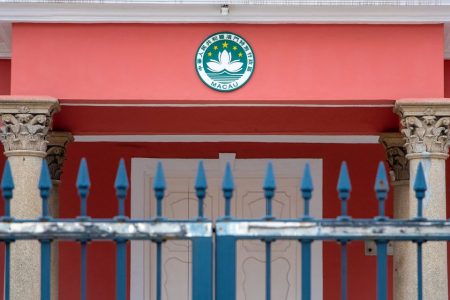Executive Council spokesman Leong Heng Teng has announced that the government has finished drafting local legislation for the country’s National Anthem Law to be applied in Macau, following its inclusion in Annex 3 of the Macau Basic Law as one of the national laws to be applied in the special administrative region.
Addressing a press conference at Government Headquarters on Friday, Leong said that the council, the government’s top advisory body, has completed its discussion of the bill amending the existing local law on the use and protection of the national flag, national emblem and national anthem.
The bill will be submitted to the Legislative Assembly (AL) for debate and vote.
Leong noted that the country’s National Anthem Law was passed by the Standing Committee of the National People’s Congress (NPC) in Beijing on September 1 last year and took effect on October 1.
Leong noted that on November 4 the NPC Standing Committee passed a decision to include the National Anthem Law in the Macau Basic Law’s Annex 3 for it to be applied in Macau.
On November 4, the NPC Standing Committee adopted decisions to apply the National Anthem Law both in Hong Kong and Macau, the nation’s two special administrative regions. According to the decisions, the National Anthem Law was to be included in Annex 3 of the Hong Kong Basic Law and Annex 3 of the Macau Basic Law. Both annexes list the national laws, resolutions and regulations to be applied in the two regions.
According to the basic laws of Hong Kong and Macau, national laws shall not be applied in the two autonomous regions, except for those listed in Annex 3 of their respective basic laws.
According to Leong, Chief Executive Fernando Chui Sai On formalised November’s decision by the NPC Standing Committee by promulgating it in Macau’s Official Gazette (BO) on December 4.
Leong said that afterwards the local government started the legislative process for drafting related local legislation for the National Anthem Law to be applied in Macau.
Leong noted that Macau’s legislature already passed local Law No. 5/1999 on the establishment day of the Macau Special Administrative Region (MSAR) on December 20, 1999 which regulates the use and protection of the national flag, national emblem and national anthem. He said that the local government, therefore, is proposing amendments to this local piece of legislation, with the aim of applying related rules in the National Anthem Law in Macau.
Local Law No. 5/1999 states that the nation’s symbols – the national flag, national emblem and national anthem – are to be respected and protected.
According to Article 9 (1) of the law, blatant insults or disrespect to a national symbol (the national flag, national emblem and national anthem) are punishable by a fine or up to three years’ imprisonment.
According to Article 9 (2.2), the act of maliciously not following the score or modifying the lyrics when playing the national anthem constitutes disrespect to a national symbol.
Leong noted that the existing local Law No. 5/1999 does not ban the use of the national anthem on any particular occasions.
According to Leong, the bill proposes that the national anthem must not be used in commercial activities or advertisements, at private funeral events, and as background music at public venues. The bill proposes that the offender will face a fine of between 5,000 patacas and 50,000 patacas.
The bill proposes that when the national anthem is performed and sung, those present shall stand and deport themselves respectfully, and must not disrespect the national anthem, according to Leong.
The bill proposes amendments to Article 9 of the existing local Law No. 5/1999. The amendments propose that the act of deliberately altering the lyrics or the score of the national anthem, or performing or singing the national anthem in a deliberately distorted or derogatory manner at a public venue, will constitute a blatant insult to a national symbol, according to Leong.
According to Leong, the bill also proposes that the national anthem is to be included in secondary and primary education.
The bill proposes that secondary and primary schools shall teach their pupils to sing the national anthem, and educate them on the history and spiritual connotation of the national anthem and to obey the etiquette for performing and singing the national anthem, according to Leong.






